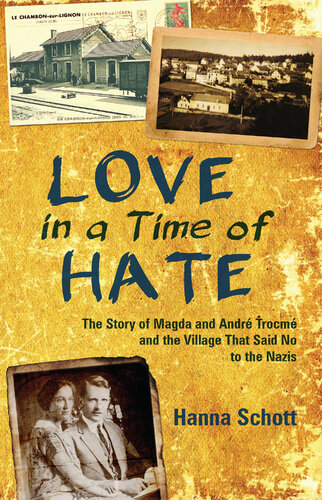
Love in a Time of Hate
The Story of Magda and André Trocmé and the Village That Said No to the Nazis
کتاب های مرتبط
- اطلاعات
- نقد و بررسی
- دیدگاه کاربران
نقد و بررسی

April 10, 2017
Schott, a German journalist, covers the story of Le Chambon, a French village that harbored Jews during World War II, through a biography of village pastor André Trocmé and teacher and social worker Magda Trocmé. The story of Le Chambon is inspiring, but this work is uneven in its treatment of the subjects’ lives: more than half the book is dedicated to their childhoods and early marriage years, often providing great detail and psychological insights, while the years of World War II and their actions in sheltering refugee Jews are treated hastily and with vague generalities rather than insight into their specific motivations. Additionally, Magda, a fascinating personality, is allowed to fade into the background as a generic wifely figure rather than being treated as an active hero in her own right. However, the book’s account of European lives in the early 20th century will appeal to readers, as will the additional details of the Trocmés’ religious faith and the haven they helped build at Le Chambon, which deserves to be widely recognized.

Starred review from June 1, 2017
Journalist Schott builds upon the historical narrative of wartime resistance first documented in Philip P. Hallie's Lest Innocent Blood Be Shed by chronicling the tiny village of Le Chambon-sur-Lignon's passive resistance during World War II via the life and moral leadership of reformed pastor Andre Trocme and his wife, Magda. From their perspective, Schott documents the triumph of goodness and will, in which the conviction of a single couple meant the difference of life or death for Jewish children hidden in plain sight during some of the most brutal years of German occupation in France. But this portrays a picture only of the public Trocme, who seems to have sacrificed home and family for a higher cause. In fact, the Trocmes had four children, one of whom died during this period but merits only a paragraph, which might leave readers wanting more. This is a story that needs telling; the sacrifices and commitment to the Christian love ethic permeate Trocme's own words as well as those written about him. VERDICT A highly recommended read that valorizes the good that people can do.--SC
Copyright 2017 Library Journal, LLC Used with permission.

























دیدگاه کاربران